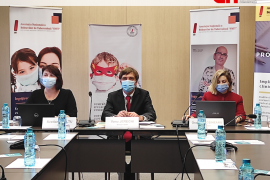News
First National Conference on Human Rights in TB - 10 December 2021
10 December is proclaimed by the UN General Assembly as the International Day for the Observance of Human Rights, in context, it is also an opportunity to promote respect for human rights - as a fundamental goal to overcome economic, geographic, socio-cultural and health system barriers that prevent people with TB from accessing essential health services.
On this occasion, on December 10, 2021, the first National Conference dedicated to Human Rights in TB took place. Representatives of governmental, non-governmental and international organisations shared their expertise with the participants and discussed various issues related to the rights of people with TB. "We are not only talking about TB from a medical perspective now but also from a human rights perspective," said Svetlana Nicolaescu, State Secretary at the Ministry of Health. This idea was repeatedly supported by representatives of other institutions.
The Republic of Moldova is among the high priority countries for TB control in the WHO European Region among the countries in the world with high MDR TB burden, TB being a public health priority at the national level. Although health is recognized as a human right in the Republic of Moldova, barriers related to community involvement, human rights, stigma, including gender barriers, have been reported in the process of accessing health services. These barriers can increase vulnerability to TB or reduce access to TB prevention, diagnosis, treatment and care services, and consequently, these inequalities influence people's ability to realize their right to health.
Various services for people with TB are now becoming available across the country, including social and legal assistance, support in protecting employment and education rights. The person-centred approach is fundamental in the implementation of all support activities.
During the COVID-19 pandemic, the Republic of Moldova faced many challenges, but this served as an opportunity to develop digital solutions such as Video Assisted Treatment (VST), reports Alexandru Voloc, WHO/Molodva representative. In the same vein, special attention has begun to be paid to the mental health of people affected by TB and the double stigma to which they have been particularly susceptible during the pandemic period.
Stigma and discrimination remain an area of concern for the TB Platform Moldova and the institutions working in the field, as it affects not only the quality of services but also the rate of referrals to these services. Currently, in collaboration with the PAS Centre, AFI Moldova and other NGOs in Moldova, they are conducting research to determine the barriers faced by people with TB and to develop a strategy to combat stigma in the population. The data collected will be used to develop an application that will contain all the information on the subject and the possibility to give their opinion.
According to experts, some of the most vulnerable groups remain children and women, due to the limited adaptation of the service package for people with TB to the specific needs of these social groups. However, progress is continually being made in this regard and ongoing projects are mainstreaming gender and age.
A specific challenge is the right of people with TB in detention, due to the specific conditions to which these people are subjected, and the distinctive nature of the administrative organisation of the medical aspect in detention institutions. According to Svetlana Doltu, Executive Director of AFI Moldova, "Detainees are a vulnerable group to TB and access to prevention, diagnosis, treatment and support services must be made available on an equal basis to that in the community". Treatment interruption after release should not be allowed either. In this regard, a well-defined mechanism must be developed between the Ministry of Justice and the Ministry of Health to allow continuity of treatment.
The conference was attended by more than 200 people, representing non-governmental, governmental and international organisations. This conference is scheduled to take place every year to collect and exchange new information on the rights of people with TB.
Other news
- 18 July 2022Ensuring access for psychological, sexual reproductive health and HIV prevention services for Adolescent Girls and Young Women refugees with a focus on key and vulnerable populations (people living with HIV, children and adolescents, women etc)
- 19 June 2022Assessment of the level of training of sex workers in Chisinau (capital of the Republic of Moldova) in Community Mobilization, including involvement in HIV control measures
- 14 April 2022A pilot implementation study to scale-up methadone in incarcerated persons with opioid use disorder and retain them on treatment after release in Moldova

